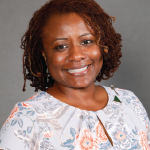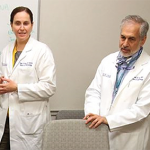
Gustavo Frazao / shutterstock.com
Hazel L. Breland, PhD, ORT/L, FAOTA, CLA, assumes the role of ARHP president in October. She is the 50th person to hold that honor, and the organization’s first African-American leader.
“Several things came together at one time that I didn’t necessarily think about when I was asked what my aspirations in the organization were in terms of executive leadership,” says Dr. Breland, associate professor and academic fieldwork coordinator of occupational therapy at the Medical University of South Carolina (MUSC), where she is also the director of the Dr. Raymond S. Greenberg Presidential Scholars Program. “What I hope to do is continue to have a passion for interprofessionalism and putting that on everybody’s radar, … yet I want to also maintain a focus on those things that are important to me—diversity, inclusion and those who are underserved in rheumatology.”
When Dr. Breland first began attending the University of South Carolina, she thought she might become an electrical engineer, in part because she was skilled at math. But she ultimately chose to pursue occupational therapy (OT). It was during this time she learned the important role OT had played in her father’s life as he recovered from several major on-the-job injuries that required surgery. He worked in construction when she was young.
“I could personally see the benefit of OT and see what this profession does to help people live their lives to the fullest,” Dr. Breland says.
After college, she moved to Washington, D.C., to attend the College of Nursing and Allied Health Sciences at Howard University, where she also trained and practiced at the MedStar National Rehabilitation Hospital. She became invested in rheumatology later, during her doctoral studies at the University of Pittsburgh.
“I received a fellowship, and part of that fellowship allowed me to serve as a research coordinator for a randomized clinical trial for women with fibromyalgia,” Dr. Breland explains. Several of her mentors were ARHP members, and it wasn’t long before she joined the organization and began attending Annual Meetings, presenting posters and giving talks.
Professionalism
“I believe that as a professional, it’s important to be part of professional associations,” she says. “I maintain several professional association memberships, and I can say that my participation in ARHP has really stood out because of the interprofessional nature of the organization. It’s been critical to my personal development, and I find that, as professionals, engagement is important to who we are.”
After several years at the University of Pittsburgh—earning her MS and PhD and serving as a research coordinator—Dr. Breland transitioned to MUSC, where she has worked the past 12 years. She joined the MUSC Lupus Research Group, in part because it allowed her to continue interacting with patients and helped ensure the “role and benefits of occupational therapists, physical therapists and other health professionals are on the minds of rheumatologists.”
Through it all, she has focused on health disparities, particularly among people with rheumatic conditions, and helping ensure better representation across populations is maintained in research studies and clinical education.
‘I don’t always have the answers, but I can help people get the resources they need.’ —Dr. Breland
A Local Resource
Today, she lives in Colleton County, where she grew up. Her experiences there helped shape the provider she is today—and are part of why she is willing to travel 50 miles each way to work daily.
“I am from the fifth largest county by land area in South Carolina, but it is relatively rural and significantly underserved in terms of specialty healthcare providers,” says Dr. Breland. “Learning about health disparities and rheumatic conditions allowed me to see and have a better understanding of the things I saw growing up but didn’t [understand]. I knew people with lupus, but I didn’t know what lupus was.”
She often finds herself serving as a resource for her community. “I don’t always have the answers,” she says, “but I can help people get the resources they need.”
Although her commute may be long, it allows her to remain near to her parents. And she takes advantage of the drive time to listen to podcasts, music and her daily devotional. Family, God and faith are important parts of her life.
Dr. Breland is an avid power walker. And she says her favorite hobby is eating, especially her mother’s cooking. “My mom is an excellent cook. I was born and raised in the South, but there are not many Southern dishes I eat outside of my mother’s cooking.”
Opportunity Knocks

Dr. Breland
Dr. Breland can’t help but feel grateful for the life she has led thus far, but she also endeavors to give back, citing a quote from Scripture: “To whom much is given, much is required.”
“I have lived a blessed life, and I have had a lot of people see things in me and willingly invest in and support me,” Dr. Breland says. “I take that very seriously, and I want to be able to do that for others, … but I know there is still a lot of work to be done.”
She sees her term as ARHP president as an opportunity to begin to close a representation gap and to help give voice to those who have not been heard.
“I think about the passion I have for equity and inclusion, and I think about what [the first African-American Supreme Court Justice] Thurgood Marshall said: ‘In recognizing the humanity of our fellow beings, we pay ourselves the highest tribute.’”
From Wisconsin, Kelly April Tyrrell writes about health, policy and science.

